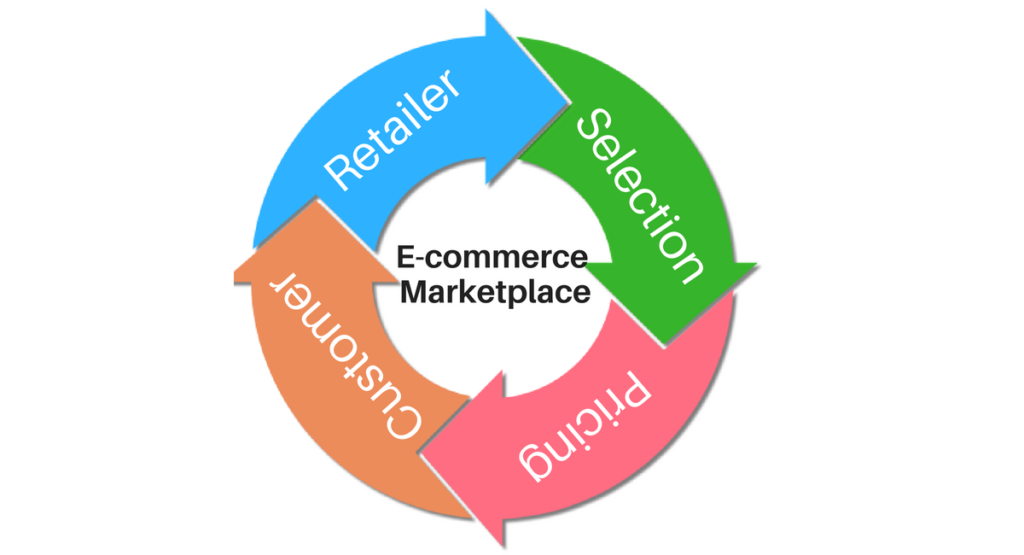
- Products
- Solutions
- Learn
- Partner
- Try Now
Unlike Brick and Morter stores, the local market makes no sense in the e-commerce marketplace. The location of the business doesn’t affect the sales of the product in case of e-commerce marketplace. The product can be sold into the national and international market without any hassle, enterprises just require internet connectivity. E-commerce marketplace is a website or platform that allow multiple vendors to list their product offering. E-commerce marketplace is responsible for gathering traffic on the website, rest all is handled by vendors including manufacturing and delivery of products. These days, marketplace themselves build their in-house delivery team. The reason behind building an in-house delivery team is to offer the best delivery services to the consumers. As a matter of fact, such e-commerce marketplaces are able to retain customers and acquire customers on the basis of delivery service experience.
Why is E-commerce Marketplace growing?
The online marketplace is growing very fast because of the networking effect. The e-commerce marketplace platform value increases with a rise in the number of users, consequently attracting more number of vendors. The listing of products by various retailers/vendors creates vast product selection for consumers. Huge competition among retailers/vendors on the same marketplace platform led retailers to lower the price of offered products. It creates an ecosystem, vast product selection and low prices attract consumers, which further attracts retailers/vendors. E-commerce marketplace scales up quickly enhancing the networking effect. The e-marketplaces create benefits for both consumers and retailers by retaining the consumers and adding more retailers on the platform.

Why B2B E-commerce Marketplace?
E-commerce marketplace is eating the traditional marketplaces. 41% of all digital commerce sales was contributed by e-commerce marketplace in 2017. E-commerce marketplace is penetrating into our world. The rise of the internet, the rise of digital devices has transformed our shopping experience already. Naturally, the b2c sector is following the trend and gradually is transferring the revenue to the digitalized enterprises out there. We see that already in 2017, 30% of the businesses have been placing their supply orders online. The reason behind the growth is naturally similar to the consumer industry, the internet, and the devices that connect the consumers.
The businesses are heavily affected by their business process digitalization which also joined the digital e-commerce growth. Most connected markets are originally making great progress in building IoT ecosystem and connecting them to their b2b supply chain e-commerce. We have observed in 2017 that the highest growth rate and the most revenue share comes from the e-commerce in the b2b sector is in raw material and component industry such as woods, metal, plastics or rubber. All of them are basic components in making the finest consumer goods. Since they are already digitized, the share of revenue is among the highest in the b2b sector. Hence we believe that business digitalization will continue driving e-commerce growth in the b2b sector.
It is expected that many e-commerce marketplaces will gain traction in coming years focussing totally on the b2b sector. By 2025, in the most developed economies, up to 45% of revenue will be from the e-commerce marketplace. Since the transaction size is b2b sector is huge, an e-commerce marketplace for b2b sectors will be a niche market to start.
Why not avoid E-commerce Marketplace?
Making a decision to work with an e-commerce marketplace is similar to making the business decision. In fact, the brand you have decides the decision to list your products on e-commerce marketplace. E-commerce marketplace must be a good fit for your brand. Most of the e-commerce marketplace is selling millions of products on the platform. Horizontal e-commerce marketplace is a good fit for the mass brand but the vertical marketplace is a good fit for premium brands. Increasing sales and customer acquisition are basic objectives for retailers to list products on the e-commerce marketplace. Brand awareness, long-tail product sales, and entering into foreign markets are also the primary reason for adopting e-commerce marketplace.
To avoid e-commerce marketplace, retailer or brand must have a strong customer base that will seek out the brand product outside the e-commerce marketplace. Customers might seek products directly from the brand website or brand store if the brand value is very strong. Usually brand avoids e-commerce marketplace to create a superior shopping experience for customers. Premium brand differentiates their customer by creating a superior experience and direct to consumer sales channel. The premium brands create a tight supply chain and policies for brand resellers to stop them to list products on any e-commerce marketplace.
Case Study:
Premium brands such as Nike also work with e-commerce marketplace but took a different approach. Nike created an online official store on Alibaba in 2012. For sale in China, Alibaba is the largest marketplace. Creating an online official store on Alibaba differentiate Nike from other brands. Nike is too big to say no for any e-commerce marketplace. E-commerce marketplace is key distribution channels these days but for premium brands like Nike, marketplaces are too big to ignore and sales may not be the only objective for premium brands.
Get in Touch with us if you want to build the next big e-commerce marketplace! And let’s begin your journey to success.
Subscribe to stay ahead with the latest updates and entrepreneurial insights!

Subscribe to our newsletter
Get access to the latest industry & product insights.





















